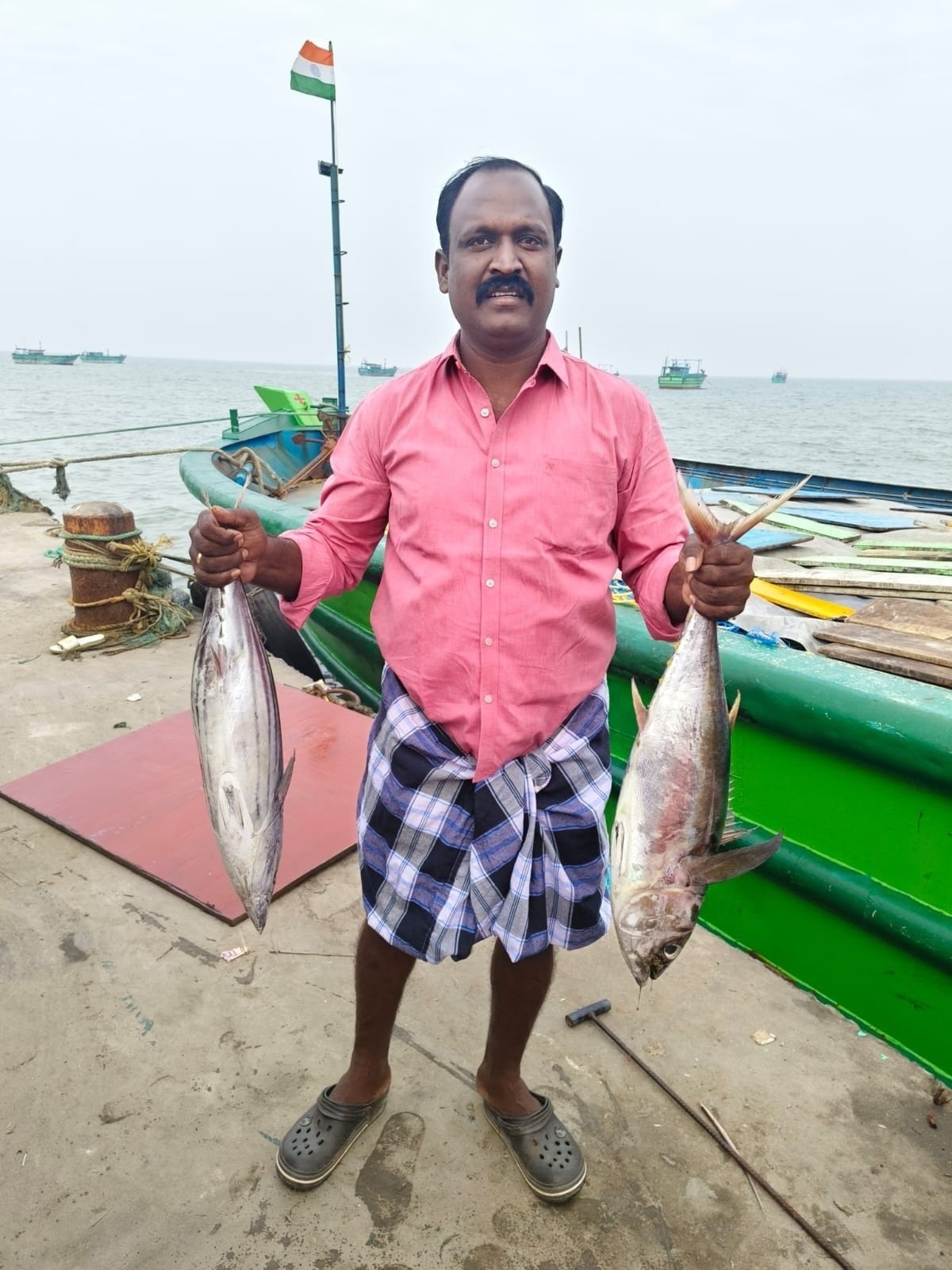“Fishing Smarter: How Traditional Wisdom and FFMA Transformed One Fisherman’s Fortune”
Overview
Name: Mr. Antony Dhanabal
Age: 44 years
Village: Tharuvaikulam
District: Tuticorin, Tamil Nadu
Fishing Experience: 30 years
Fishing Assets: Mechanized boat with gill nets
Background
Hailing from Tharuvaikulam, a coastal fishing village in Tuticorin district, Antony Dhanabal has spent 30 years navigating the seas. His fishing practices involve venturing up to 150 km into the deep sea, staying at sea for 25 to 30 days with his mechanized boat. Fishing is not just his livelihood but also a testament to his expertise and adaptability to the ever-changing marine conditions. In September 2018, he adopted the Fisher Friend Mobile Application (FFMA), a tool that revolutionized his fishing operations. By integrating scientific insights with his traditional knowledge, Mr. Antony has successfully enhanced his fishing efficiency, safety, and profitability.
Blending Traditional Knowledge with Scientific Tools
Antony's ability to combine his traditional expertise with scientific data has proven to be highly effective. His deep understanding of traditional indicators is remarkable:
Tuna Fishing: Occurs when marine water temperatures range from 27°C to 28°C, with dark brown water and currents at approximately 1 nautical mile, typically beyond 100 km from the shore.
Swordfish Fishing: Found in water temperatures of 29°C to 30°C, light blue water, and weak currents below 0.5 nautical miles, usually within 50 km from the shore.
Despite these observations, Mr. Antony acknowledges the growing uncertainty caused by climate change, stating, "Fish prediction accuracy has reduced, and it is no longer reliable to depend solely on traditional knowledge. Integrating both scientific and traditional knowledge provides better results."
A Breakthrough Fishing Expedition
During the third week of March 2024, Mr. Antony relied on the FFMA to access information from INCOIS services, including sea surface temperature and water current data. The observed conditions were a water temperature ranging from 27°C to 28°C, water currents below 1 nautical mile, a distance of approximately 50 kilometres from the shore, and a water colour described as dark brown.
He decided to release his gill nets at the identified location. After patiently waiting for two hours, he and his crew lifted the nets manually. The result was a catch of 1 ton of high-value tuna fish, sold at ₹80 per kg, earning ₹80,000.
In his words, “Using FFMA and scientific data along with my traditional knowledge has helped us secure better catches and improve our earnings. Earlier, we used to earn ₹50,000 on similar trips, but now we earn an additional ₹30,000. This has been a game-changer for us.”
Economic Impact and Benefits
The success of this trip was evident in its economic outcomes, with a total revenue of ₹80,000, trip expenses amounting to ₹30,000 (covering fuel, food, and crew wages), and a net profit of ₹50,000. Traditionally, similar trips yielded fish worth only ₹50,000. With the integration of traditional and scientific knowledge, Antony and his crew achieved a 60% increase in profitability, significantly benefiting the boat owner and crew members.
Significance for the Community
Antony’s approach has inspired other fishermen in Tharuvaikulam to explore the potential of combining scientific tools like FFMA with their own indigenous knowledge. Key takeaways from this shift include enhanced fishing efficiency, with reduced trial-and-error saving fuel and time; improved livelihoods, resulting in increased income for boat owners and crew members; and the promotion of sustainable practices through optimized fishing locations, which helps reduce environmental impact.
"Thanks to the app, we’ve not only avoided dangerous trips but have also been able to earn more by fishing smarter, not harder."
Conclusion
Antony Dhanabal’s story highlights the importance of balancing traditional knowledge with scientific innovation to adapt to the challenges posed by changing marine ecosystems. The FFMA, combined with his expertise, has not only enhanced his fishing outcomes but also provided a sustainable model for other fishermen in coastal Tamil Nadu. This integration of tools and knowledge ensures the long-term resilience and prosperity of fishing communities.
